Published Feb 19, 2021
Star Trek Has A Lot to Say About Fascism
And we should listen.
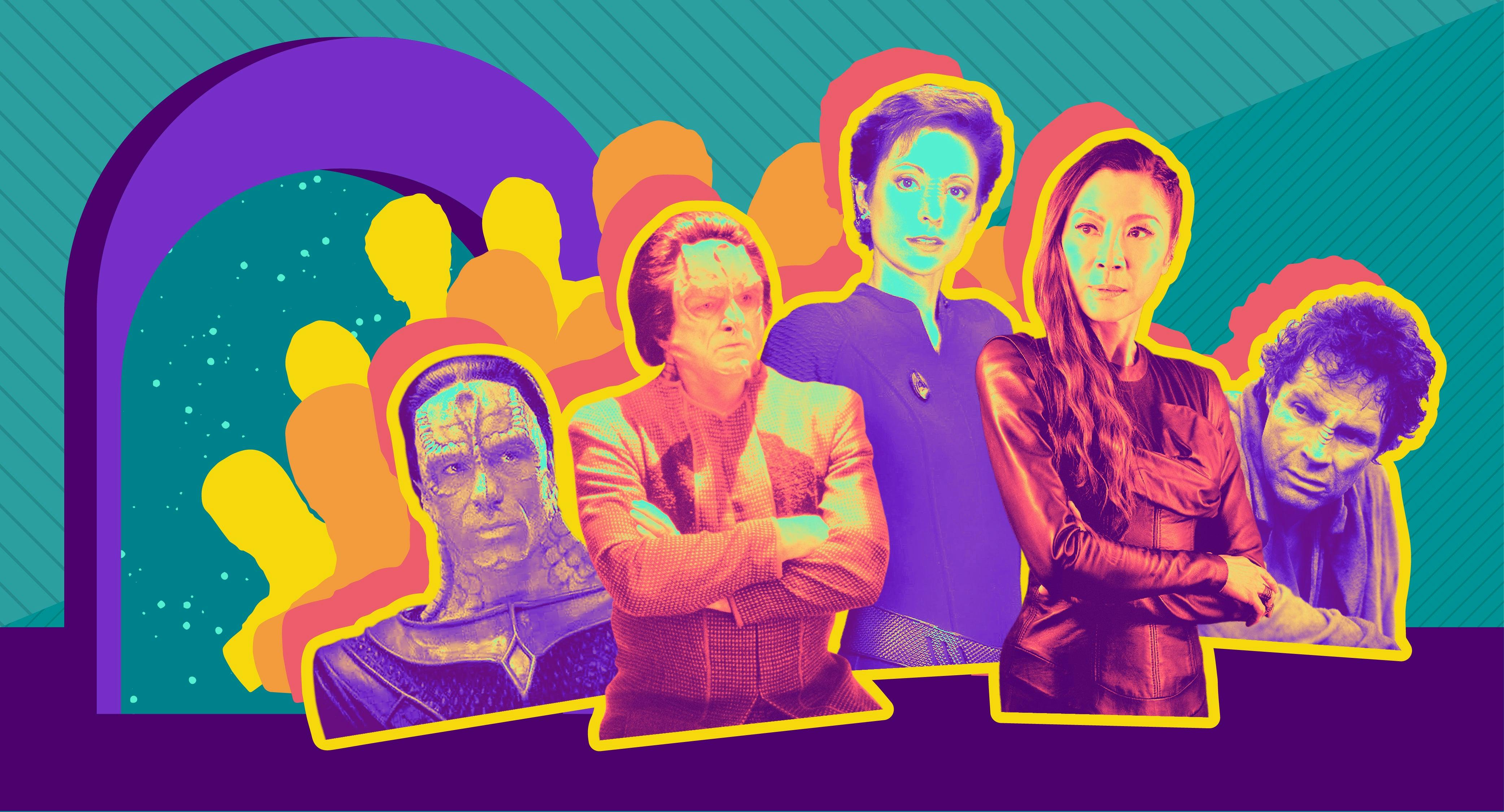
StarTrek.com
The season one episode of Deep Space Nine, “Battle Lines,” finds the crew stranded on a war-torn moon. While the others look for escape, Major Kira takes a different approach. She grabs a phaser and starts trying to help their hosts win their war. Despite how eager she seems, there is no enthusiasm in her demeanor: no joy or bloodlust. She is just an angry, frightened woman trying to stay alive longer than the people shooting at her. After a lifetime spent fighting Cardassian rule, fear and anger are a part of her. Even after the liberation of Bajor, that fear still drives her.
What Kira Nerys is scarred by is not just a life spent in refugee camps and battlefields. It’s a life under fascism. The Cardassian Union is a traditionalist, nationalist dictatorship with an almost cult-like reverence for military prowess, imperialism, and machismo. Taking over planets like Bajor is seen as their right as a superior race, and Bajorans and the rest are sub-Cardassians, to be dealt with like a pest infestation. It is this mentality that has molded Kira and all of Bajor. Kira joined the Resistance when she was barely big enough to carry a phaser rifle. She fought tirelessly against an enemy that outnumbered and outgunned her, that had the advantage of ships, supply lines, and a space station. Somehow, despite the odds, she won. She found herself in a free Bajor with no Cardassian rulers and a badge that said she was in charge. But was she free?
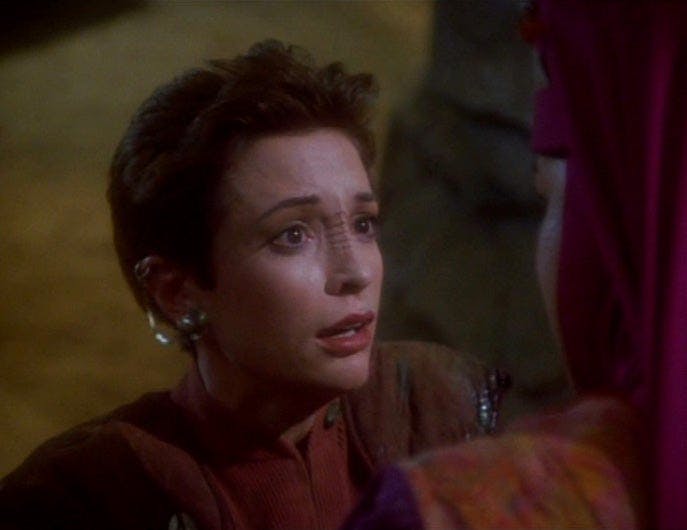
StarTrek.com
It is not only the enemies of fascism, the Untermensch whose deaths and oppression are supposed to pave the way to an impossible future, who suffer from that ideology. It is also the good citizens who help put the plans into action. Even those at the top, those with unimaginable power over armies, over whole worlds, are poisoned by its lies and manipulations. In Star Trek: Discovery, Michael Burnham finds a familiar face in the mirror universe. Far from a diplomatic and noble Starfleet captain, this Philippa Georgiou leads the Terran Empire, a totalitarian kratocracy, where succession of the crown is often decided at the end of a blade.
Insubordination, 'wrongthink', or anything that might piss off those in charge is punished by a swift death if you’re lucky, and by time in an agony booth if you’re not. The empire is expansionist and militaristic, fetishizing violence and worshipping their weapons. They are racial supremacists, and the only non-humans they keep around are slaves or, horrifically, food. Rescued from a coup and brought over to our universe, Georgiou struggled from the outset. To her imperial, fascist mindset, the Discovery crew’s compassion was weakness, their diversity, depravity, their intellectualism, pretentiousness. Beneath that mask of contempt was fear. As Emperor, she had soaked herself in fear as much as she had doled it out. The early episodes of Discovery’s third season finds Georgiou suffering from some unknown but excruciating malady, yet she resists treatment. For every question Doctor Culber asks, every gentle request to scan or sample, she retorts with a cutting jibe or a threat on his life. Is that simply the behavior of stuck-up royalty, or is it someone who lived under the threat of sabotage, assassination, and betrayal her whole life? When one is taught that “life is permanent warfare,” as Umberto Eco describes in his essay “Ur-Fascism,” a medbay looks no different than a battlefield.
For all too many, the things they experienced under fascism, the things they did or failed to do, create a burden too powerful to shake loose. What we now know as Survivor’s Guilt was originally called ‘concentration camp syndrome’ after therapists recognized a pattern in the Holocaust survivors they were treating. While much of the trauma was rooted in the horrible things done to them, there was also considerable trauma from the horrors they avoided or survived. For Italian author Primo Levi, it haunted him the rest of his life, marking his writings until his untimely death, often thought to be by suicide. Fellow author and holocaust survivor Elie Wiesel remarked, “Levi died at Auschwitz 40 years later.”
We see survivor’s guilt play out often in Star Trek — there’s even a Memory Alpha page for it. When Li Nalas is rescued from a Cardassian labor camp, he is anything but thankful. Back home on Bajor he is celebrated as a hero, but resents it. All he did was kill an unarmed Cardassian, and Bajor is ready to cast statues of him in latinum. Why did he make it back when so many others never got the chance? We watch Li grapple with the burdens of his fame and his new life over the first few episodes of DS9’s second season. Over and over again he tries to run away, to hide, to return to the privacy of his supposed death. Finally, it seems like he is willing to live his new life, but when a reactionary fires a phaser at Commander Sisko, Li jumps in front of it. His final words, as Sisko grasps his hands? “Off the hook after all.”
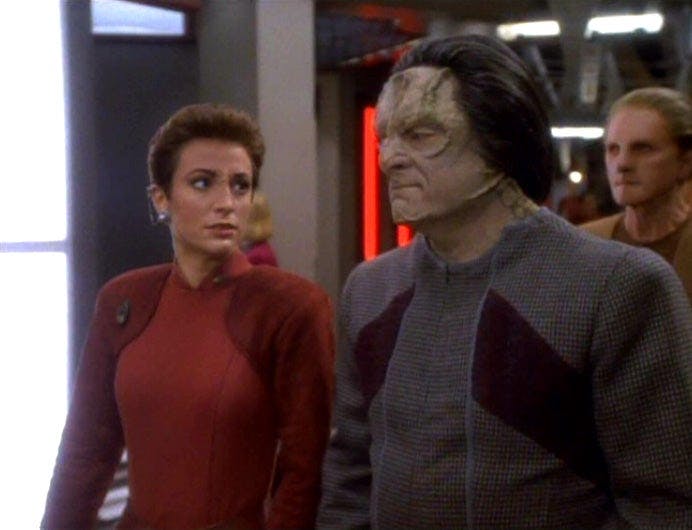
StarTrek.com
Cardassian file clerk Aamin Marritza experiences an entirely different sort of guilt. “Duet” finds him on Deep Space Nine under curious circumstances. Marritza has altered his appearance to resemble that of Gul Darhe’el, commander of Gallitep, one of the Cardassians’ most brutal and inhumane prison camps, and pretends to be him. He taunts Kira, reciting his heroism as the proud Darhe’el, and denying the horrors the Cardassians had inflicted with a dismissive, “Atrocities? What atrocities?” Umberto Eco describes Mussolini as not having, “any philosophy: he had only rhetoric.” Here is a man with nothing left to believe in, clinging to the rhetoric in which Cardassians are so well practiced. Eventually, he crumbles. Neither mass murderer nor even a soldier, Marritza was just what he seemed, a file clerk “who was only good for cowering under his bunk and weeping like a woman… covering his ears so he wouldn't have to hear the Bajorans screaming for mercy.” Marritza has not come to DS9 to plead for mercy or forgiveness. He has come so “Cardassia [will] acknowledge its guilt.” He has come to play the role of Eichmann in Jerusalem, complete with unwilling arrest and claims of moral duty. He has come to be killed. Burdened both by his failure as a person and as a fascist, neither compassionate enough nor cruel enough, he becomes a haunted version of Eco’s “Ur-Fascist hero,” who is “impatient to die.”
While trauma never really goes away entirely, it is not a death sentence. Austrian psychiatrist and neurologist Viktor Frankl lost just about everything at Auschwitz. His parents, wife, and brother all died in the camps. Even the manuscript of his first book, his life’s work, was destroyed. But he did not lose his life or his mind, as he describes in his book, Man’s Search for Meaning:
"When in a camp in Bavaria I fell ill with typhus fever, I jotted down on little scraps of paper many notes intended to enable me to rewrite the manuscript, should I live to the day of liberation. I am sure that this reconstruction of my lost manuscript in the dark barracks of a Bavarian concentration camp assisted me in overcoming the danger of cardiovascular collapse."
That manuscript, lost and recreated, was published in 1946 as The Doctor and the Soul. It introduced his theory of logotherapy, or “healing through meaning,” which asserts that what a person needs most is meaning in their life. They need a purpose, something they feel is central to them. For Frankl, his book was that purpose and his focus on writing it kept him alive. While few therapists practice or even study logotherapy today, elements of it can be found in more contemporary notions, like Post-Traumatic Growth (PTG). Developed in the mid-90s by psychologists Richard Tedeschi and Lawrence Calhoun, PTG is the phenomenon where trauma becomes more than just a burden, and is actually an opportunity to grow, as Lorna Collier describes in her American Psychological Association article, “Growth After Trauma”:
"Tedeschi says sometimes traditional therapy for trauma patients gives people short-fix solutions to help them resume daily functions, such as sleep or work, but may not provide them with a way of living "beyond just getting by .... We've got to attend to their experience of life and how meaningful, satisfied and fulfilling it is."
For every Li and Marritza devoured by guilt, every Winn and Dukat whose greed for power had them internalize the fascist lies, Trek also has plenty of successes. Philippa Georgiou fosters a deep friendship with our universe’s counterpart of her adopted daughter, despite their differences. She gains a begrudging respect and empathy for the Discovery crew. She admires Saru, whose race she kept as slaves and cattle in her universe. By the time she departs the show, she’s able to openly discuss her feelings for Burnham. Two powerful Cardassians, Tekeny Ghemor and Corat Damar, lost their families at the hands of a fascist nation they helped strengthen. Far from losing their minds as Gul Dukat did or any of us might, they became stronger, fighting to change Cardassia and the galaxy, to push fascism back into the darkness where it belongs.
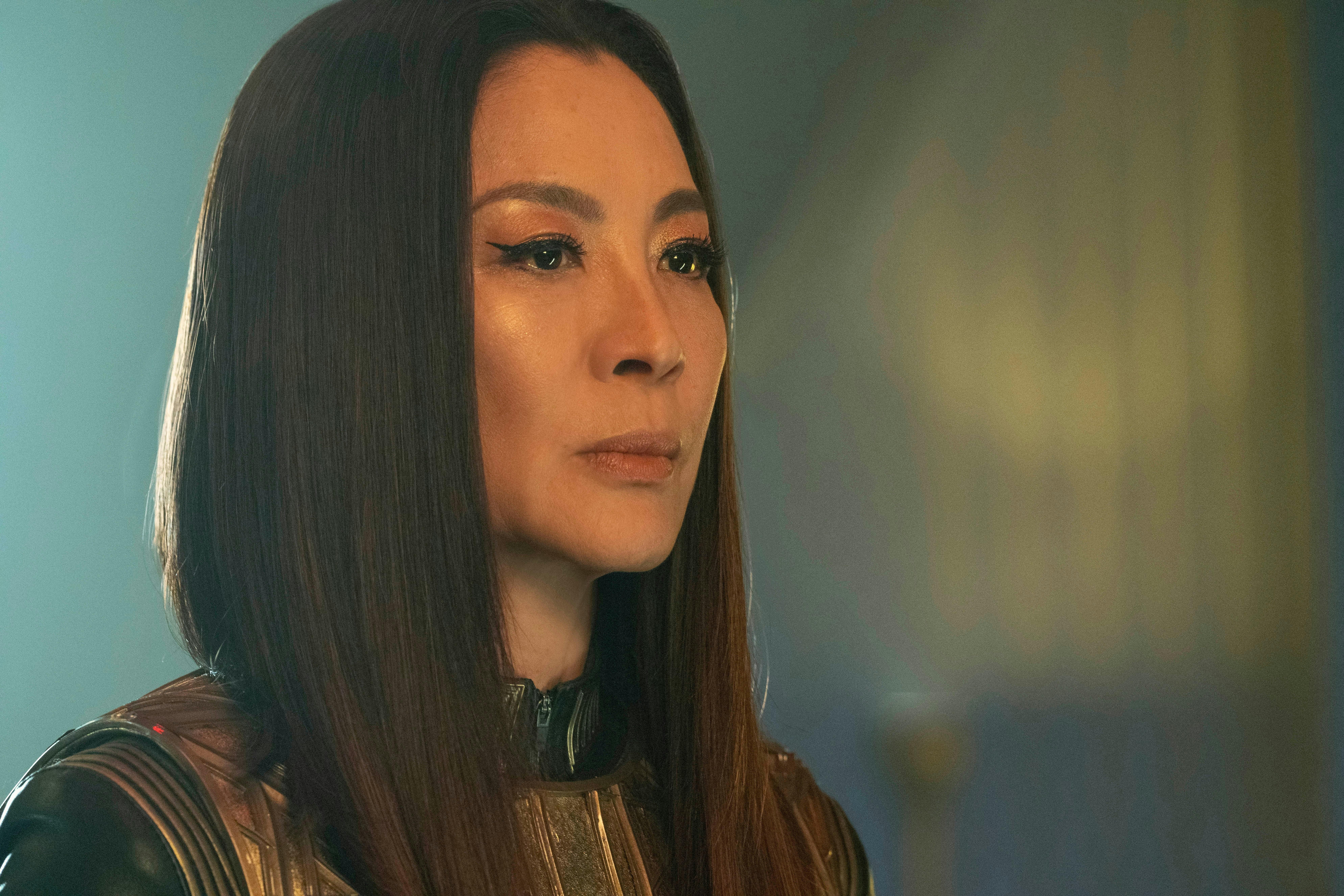
StarTrek.com
When we meet Kira Nerys in “Emissary,” she is an embittered, cynical loner. She has fought too much, killed too much, survived too many friends and family members. She can’t accept her victory and doesn’t believe the provisional government stands a chance of lasting more than a few weeks before civil war breaks out. She seems unwilling or incapable of meaningful communication and only accepts help under duress. In “Duet,” meeting Marritza, whether he is Marritza or Darhe’el, is visibly traumatic for her. She is unable to explain why she needs to arrest Marritza without breaking into choked sobs. When she questions him, it doesn’t take long for Marritza to upset the power dynamic with denials and obfuscations. Her posture goes rigid, her voice shakes, her jaw clenches. She is ready to attack again. The permanent war finds its permanent opposition. As the series goes on, she changes. Even by the end of “Duet,” she changes. When Marritza breaks down and pleads with her to send him to his death, she refuses to add “another murder” to the titanic list of the dead.
To ascertain whether an individual is experiencing Post-Traumatic Growth, and to help them through it, Tedeschi and Calhoun came up with a Post-Traumatic Growth Inventory.
1. Appreciation of life.
2. Relationships with others.
3. New possibilities in life.
4. Personal strength.
5. Spiritual change.
If an individual shows positive responses in these areas, they are undergoing PTG. Slowly, Kira learns to appreciate her life, such as in “Battle Lines,” when Kai Opaka urges her not to, “deny the violence in yourself… Only when you accept it can you move beyond it.” She grows her relationships, accepting Sisko as a friend and soon others after him, even taking on romances. No longer resigned to being a soldier, she finds new ways to live her life, ways to do her duty for Bajor via diplomacy, intellect, and compassion. She taps into a deep well of personal strength, challenging herself time and again, whether it’s finding non-violent solutions to difficult problems in “Shakaar” or putting aside her differences with an enemy for a common goal as in “Indiscretion.”
In season five’s “Ties of Blood and Water,” Cardassian expat Tekeny Ghemor returns to the station. In anticipation, Kira has all but rolled out a red carpet. This Cardassian, a legate of the military that terrorized her world, is more than a friend. He’s family. Even when she finds out about his involvement in the massacre of a monastery, she is able to accept that as a part of his past, if not forgive him. When Worf sees Kira’s excitement about his arrival he remarks, “Major Kira, friends with a Cardassian. It seems wrong.” Dax’s telling riposte: “You should've known her five years ago. Back then, I never thought she'd be friends with anyone.”
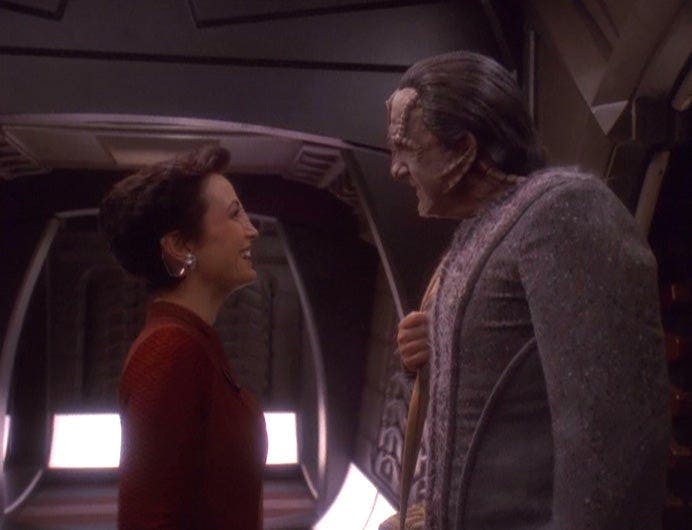
StarTrek.com
To be abundantly clear, this is not an essay about forgiving mass-murderers or fighting evil with kindness. Bajor did not force the Cardassians into withdrawal with kind words and politeness, nor did the Italian partisans, French maquis, or any other successful antifascist movement in history. While forgiveness and acceptance are recurring themes in Star Trek, they are earned, not given freely. If Damar and Ghemor are forgiven, it is because they change and because they do provable good. Compare them to Gul Dukat, whose temporary appearances of humanity are shown to be mere familial compassion mixed with lechery and egotism. No, what this is about is how fascism lives on like germs even after its hosts have been defeated. Kai Winn helps rid Bajor of Cardassians only to become an autocrat and a demagogue herself. In Italy, Edgardo Sogno was a symbol of the antifascist movement under Mussolini only to become a far-right monarchist once the war was over. From the comfortable vantage point of fictional characters like Li Nalas, Aamin Marritza, Emperor Georgiou, and Kira Nerys, we can search for a way to eliminate this germ’s hold on our psyches and move forward arm in arm into the future, where no man has gone before. I will leave you with one last quote from Umberto Eco:
If reconciliation means compassion and respect for all those who fought their own war in good faith, to forgive does not mean to forget. I can even admit that Eichmann sincerely believed in his mission, but I cannot say, "OK, come back and do it again." We are here to remember what happened and solemnly say that "They" must not do it again.
July Brown (she/her) is a writer, musician, and life-long New Yorker. You can find her at julybrown.com or writing episodes of Star Trek: Enterprise that never happened on @ENTSubplots on twitter.
Star Trek: Discovery streams on CBS All Access in the United States, airs on Bell Media’s CTV Sci-Fi Channel and streams on Crave in Canada, and on Netflix in 190 countries.

